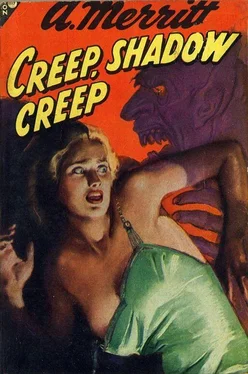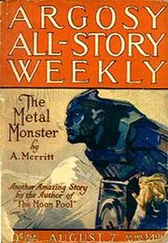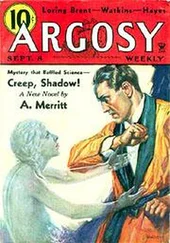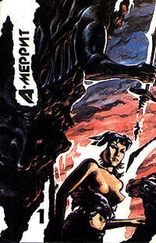"That night he dined out and came home about eleven o'clock. He went into the library to go over his mail. He told me: 'Suddenly I had the strongest feeling that someone was watching me from the curtains. I turned my head, slowly. I distinctly saw a shadow upon the curtains. Or, rather, as though it were intermingled with them – like a shadow cast by something behind. It was about the size and shape of a man.' He jumped to the curtains and tore them away. Nothing was behind them nor was there anything beyond the window to cast a shadow. He sat down again at the table, but still he felt eyes upon him. 'Unwending eyes,' he said. 'Eyes that never left me. Eyes of someone or something that kept always just past the edge of my field of vision. If I turned quickly, it slipped behind me, was watching me from my other side. If I moved slowly, just as slowly did it move.'
"Sometimes he caught a flickering movement, a shadowy flitting, as he pursued the eyes. Sometimes he thought he had caught the shadow. But always it faded, was gone, before he could focus it. And instantly he felt its gaze upon him from another quarter.
"'From right to left it went,' he said. 'From left to right… and back again… and back again and again… weaving… weaving… '
"'Weaving what?' I asked, impatiently.
"He answered, quite simply: 'My shroud.'
"He sat there, fighting until he could fight no more. Then he sought refuge in his bedroom. He did not sleep well, for he thought the shadow was lurking on the threshold; had pressed itself against the other side of the door, listening. If so, it did not enter.
"Dawn came, and after that he slept soundly. He arose late, spent the afternoon at golf, dined out, went with a party to the theater and then to a night club. For hours he had given no thought to the experience of the night before. He said: 'If I thought of it at all, it was to laugh at it as childish foolishness.' He reached home about three o'clock. He let himself in. As he closed the door he heard a whisper – 'You are late!' It was quite plain, and as though the whisperer stood close beside him – "
De Keradel interrupted: "Progressive hallucination. First the idea of movement; then the sharpening into shape; then sound. Hallucination progressing from the visual field to the auditory."
Bill went on, as though he had not heard: "He said the voice had some quality which – I quote him – 'made you feel the loathing you do when you put your hand on a slimy slug in a garden at night, and at the same time an unholy desire to have it go on whispering forever.' He said: 'It was unnamable horror and perverted ecstasy in one.'
"Simpson had left the lights burning. The hall was well lighted. He could see no one. But the voice had been reality. He stood for a few moments fighting for control. Then he walked in, took off hat and top-coat, and started for the stairs. He said: 'I happened to look down, and over the top of my eyes I saw a shadow gliding along about six feet ahead of me. I raised my eyes – and it vanished. I went slowly up the stairs. If I looked down at the steps I could see the shadow flitting ahead of me. Always at the same distance. When I looked up – there was nothing. The shadow was sharper than it had been the night before. I thought it was the shadow of a woman. A naked woman. And suddenly I realized that the whispering voice had been that of a woman.'
"He went straight to his room. He passed the door. He looked down and saw the shadow still those two paces before him. He stepped swiftly back and into the room, closing the door and locking it. He switched on the lights and stood with his ear against the door. He said: 'I heard someone, something, laughing. The same voice that had whispered.' And then he heard it whisper – 'I will watch outside your door tonight… tonight… tonight… ' He listened with that same alien mixture of horror and desire. He lusted to throw open the door, but the loathing held back his hand. He said: 'I kept the lights on. But the thing did what it had promised. It watched all night at my door. It wasn't quiet though. It danced… I couldn't see it… but I know it danced… out there in the hall. It danced and weaved… right to left… left to right and back again and again… danced and weaved till dawn outside my door… weaving… my shroud, Bill… '
"I reasoned with him, much along your lines, Dr. de Keradel. I went over him thoroughly. I could find, superficially, nothing wrong. I took specimens for the various tests. He said: 'I hope to God you do find something wrong, Bill. If you don't – it means the shadow is real. I think I'd rather know I was going crazy than that. After all, craziness can be cured.'
"I said: 'You're not going back to your house. You're going to stay at the Club until I've gotten my reports. Then, no matter what they show, you're going to hop on a boat and take a long trip.'
"He shook his head: 'I've got to go back to the house, Bill.'
"I asked: 'Why, for God's sake?'
"He hesitated, puzzled distress on his face; he said: 'I don't know. But I've got to.'
"I said, firmly: 'You stay here with me tonight, and tomorrow you hop on a boat. To anywhere. I'll let you know about the tests and do my prescribing by radio.' He replied, still with that same puzzled look: 'I can't go away now. The fact… ' he hesitated… 'the fact is, Bill… I've met a girl… a woman. I can't leave her.'
"I gaped at him. I said: 'You're going to marry her? Who is she?'
"He looked at me, helplessly: 'I can't tell you, Bill. I can't tell you anything about her.'
"I asked: 'Why not?'
"He answered with the same puzzled hesitation. 'I don't know why I can't. But I can't. It seems to be a part of – of the other in some way. But I can't tell you.' And to every question that touched upon this girl he had the same answer."
Dr. Lowell said, sharply: "You told me nothing of that, Dr. Bennett. He said nothing more to you than that? That he could not tell you anything more about this woman? That he did not know why – but he could not?"
Bill said: "That – and no more."
Helen said, coldly: "What amuses you so, Demoiselle? I do not find anything in all this that is humorous."
I looked at the Demoiselle. The little orchid sparks were alive in her eyes, her red lips smiling – and cruel.
I said: "The Demoiselle is a true artist."
There was a small, tense silence around the table. De Keradel broke it, harshly:
"Exactly what do you mean by that, Dr. Caranac?
I smiled: "All true artists are pleased when art attains excellence. Story telling is an art. Dr. Bennett was telling his perfectly. Therefore, your daughter, a true artist, was pleased. A perfect syllogism. Is it not true, Demoiselle?"
She answered, quietly:
"You have said it." But she was no longer smiling, and her eyes said something else. So did de Keradel's. Before he could speak, I said:
"Only tribute from one artist to another, Helen. Go on, Bill."
Bill went on, quickly:
"I sat and reasoned with him. Betimes, I gave him several stiff drinks. I related some famous cases of hallucination – Paganini, the great violinist, who at times thought he saw a shadowy woman in white stand beside him playing her violin while he played his. Leonardo da Vinci who thought he saw and spoke with the shade of Chiron, wisest of all the Centaurs, who tutored the youthful Aesculapius – dozens of similar instances. I told him he had become a companion of men of genius and that it was probably a sign of something like that breaking out on him. After a while he was laughing. He said: 'All right, Bill. I'm convinced. But the thing for me to do is not to run away from it. The thing for me to do is meet it and knock out.' I said:
"'If you feel you can, that's the one thing to do. It's only an obsession, sheer imagination. Try it tonight, anyway. If it gets a bit too thick, call me up on the 'phone. I'll be right here. And take plenty of good liquor.' When he left me he was quite his old self.
Читать дальше

![Абрахам Меррит - Лунный бассейн [Лунная заводь]](/books/20623/abraham-merrit-lunnyj-bassejn-lunnaya-zavod-thumb.webp)










